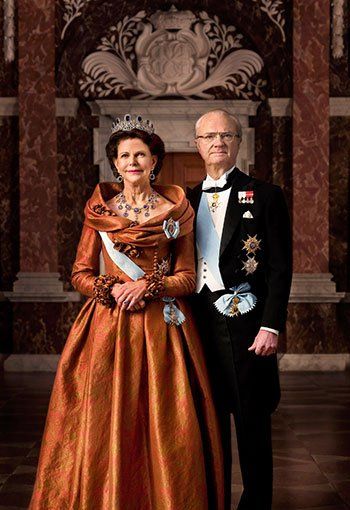In English
Purveyor to the Royal Court of Sweden
The title “Purveyor to the Royal Court of Sweden” is a personal and rare title. The Swedish King Carl XVI Gustaf considers that recipients of this honour “represent a tradition of craftwork and industry of which I frequently have reason to be proud”.*
King Carl XVI Gustaf has so far issued about 130 royal warrants. The holders are all representatives of Swedish companies and they come from a wide variety of enterprises. Many are based in rural areas. Many are small. Some are well known, others are new acquaintances. They all share a desire to supply high-quality products and services.
The current Purveyors to the Royal Court of Sweden include a bicycle manufacturer, a flag factory, a shoemaker and several furniture and furnishing companies, coffee producers and food companies.
*From the book Kunglig Hovleverantör, 2011

Becoming Royal
The issuing of royal warrants is restricted and they can only be granted by H.M. the King. Only a few of the applications received each year by the Office of the Treasurer of the Court are approved for the title of Purveyor to the Royal Court of Sweden. Orders must originate from the Royal Court, which naturally pays for the goods or service. Swedish royal warrants are only granted to companies that supply goods or services to the Royal Family. The award is evidence of satisfaction, and is usually only granted after a long period of service.
To be eligible for the title of Purveyor to the Royal Court the company must have been in business for at least five years and have managed its finances in an irreproachable manner.
A personal appointment
Swedish royal warrants are directly linked to a specific member of the Royal Family. Upon the accession of a new monarch the warrant becomes invalid and the company must apply anew for the prestigious title.
The title is also personally awarded to the head of the company and, when there is a change in the post of managing director or owner, the company must apply to renew its status as Purveyor to the Royal Court.
A royal warrant can be withdrawn at any time. The reason may be that the company has acted improperly, changed its line of business, stopped producing the product supplied to the Royal Court or undergone some other vital change.
Royal Purveyors over the years
Sweden has been a monarchy for more than a thousand years and individuals and companies have always supplied goods and services to the monarch and the Royal Family. Throughout the centuries, the title has been bestowed upon suppliers of very diverse goods and services, from casketmakers to jewellers and bakers. A more regulated system, and fee, was introduced during the reign of King Karl XIV Johan and, although the price was relatively high, the title remained attractive and prestigious.
King Gustaf VI Adolf had more than 1,100 official purveyors. Every town with self-respect had its own court photographer, jeweller and patissier.
The system was changed in 1973 when King Carl XVI Gustaf became the country’s monarch. The charge for a royal warrant was eliminated and H.M. the King set new, stricter, rules for the title of Purveyor to the Royal Court. This new approach resulted in the rejuvenation of this attractive title.
The National Coat of Arms
Holders of royal warrants can indicate this with the Greater Coat of Arms combined with the text ‘Purveyor to the Royal Court of Sweden’. In Sweden, people have become accustomed to seeing the symbol on boxes of chocolates, candles, throat lozenges and many other products. The symbol is increasingly regarded as a label of quality and, for many Purveyors, it has come to play an important role for those engaged in export trade.
For ceremonies and daily life
The products and services supplied by Purveyors to the Royal Court are used privately by the Royal Family or at Royal Palaces. Palace buildings often house the work of Purveyors and can include custom-made articles inspired by patterns and objects in the palace itself. The Royal Couple usually takes gifts when they travel abroad. The gifts are frequently the work of Purveyors to the Royal Court.

